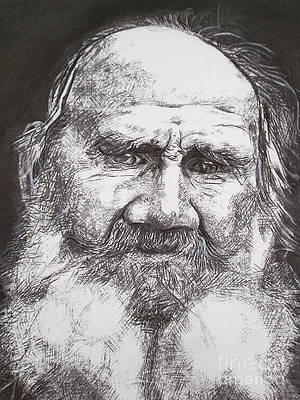Leo Tolstoy Archive
Written: 1904
Source: "Fables for Children," by Leo Tolstoy, translated from the original Russian and edited by leo Wiener, assistant Professor of Slavic Languages at Harvard University, published by Dana Estese Company, Boston, Edition De Luxe, limited to one thousand copies of which this is no. 411, copyright 1904, electrotyped and printed by C. H. Simonds and Co., Boston, Massachusetts, USA.
Transcription/Markup: Andy Carloff
Online Source: RevoltLib.com; 2021

In ancient times there lived not far from Jerusalem two brothers, the elder named Athanasius, and the younger John. They lived in a mountain, not far from the city, and supported themselves on what people offered them. The brothers passed all their days at work. They worked not for themselves, but for the poor. Wherever were those who were oppressed by labor, or sick people, or orphans, or widows, thither the brothers went, and there they worked, and received no pay. Thus the two brothers passed the whole week away from each other, and met only on Saturday evening in their abode. On Sunday alone did they stay at home, and then they prayed and talked with each other. And an angel of the Lord came down to them and blessed them. On Monday they separated each in his own direction. Thus they lived for many years, and each week the angel of the Lord came down to them and blessed them.
One Monday, when the brothers had already gone out to work and had gone each in his direction, the elder brother, Athanasius, was loathe to part from his brother, and he stopped and looked back. John was walking with lowered head, in his direction, without looking back. But suddenly John, too, stopped and, as though he had suddenly noticed something, gazed at something, while shielding his eyes. Then he approached what he was gazing at, suddenly jumped to one side, and, without looking back, ran down-hill and up-hill again, away from the place, as though a wolf were after him. Athanasius was surprised. He went back to that spot, to see what it was that had so frightened his brother. He went up to it and saw something shining in the sun. He came nearer, and there lay a heap of gold on the ground, as though poured out from a measure. And Athanasius was still more surprised, both at the gold and at his brother's leap.
"Why was he frightened, and why did he run away?" thought Athanasius. "There is no sin in gold. The sin is in man. With gold one may do wrong, but also some good. How many orphans and widows may be fed, how many naked people dressed, and the poor and sick aided with this gold! We now serve people, but our service is small, though it is to the best of our strength. With this gold, however, we can serve people better."
Thus Athanasius thought, and he wanted to tell it all to his brother; but John was out of the range of hearing, and could be seen only as a speck the size of a beetle on another mountain.
Athanasius took off his cloak, scooped up as much gold as he was able to carry away, threw it on his shoulder, and carried it into the city. He came to a hostelry and left the gold with the keeper, and went back for the rest. When he had brought all the gold, he went to the merchants, bought some land in the city, and stones and timber, and hired laborers, and began to build three houses.
Athanasius lived for three months in the city, and built three houses there: one—an asylum for widows and orphans, another—a hospital for the sick and the lame, and a third—for pilgrims and for the needy. And Athanasius found three God-fearing old men, and one of them he placed in charge of the asylum, the second—of the hospital, and the third—of the hostelry. And Athanasius had still three thousand gold coins left. He gave each old man one thousand coins to distribute them to the poor.
The three houses began to fill up with people, and the people began to praise Athanasius for everything he had done. And Athanasius was glad of that and did not feel like leaving the city. But he loved his brother and so he bade the people farewell and, without keeping a single coin, went back to his abode, wearing the same old garment in which he had come.
As Athanasius was approaching his mountain, he thought:
"My brother did not judge rightly when he jumped from the gold and ran away from it. Have I not done better?"
And no sooner had Athanasius thought so than he saw the angel who used to bless him standing in the road and looking threateningly at him. And Athanasius was frightened and only said:
"For what, O Lord?"
And the angel opened his lips, and said:
"Go hence! You are not worthy of living with your brother. One leap of your brother is worth all the deeds which you have done with your gold."
And Athanasius began to speak of how many poor people and pilgrims he had fed, and how many orphans he had housed. And the angel said:
"The devil who placed the gold there has also taught you these words."
Then only did his conscience trouble him, and he saw that he had done his deeds not for God, and he wept and began to repent.
The angel stepped out of the road and opened the path on which his brother, John, was already standing and waiting for him. After that Athanasius no longer submitted to the temptation of the devil who had scattered the gold, and he understood that not with gold, but only with words can we serve God and men.
And the brothers began to live as before.